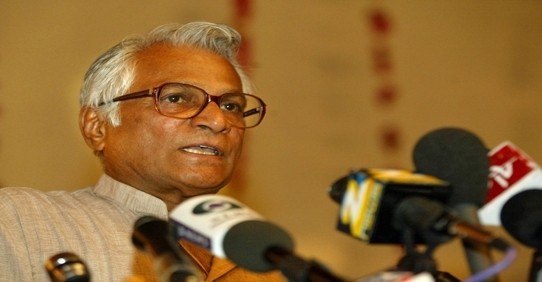
After four decades in politics, George Fernandes slowly faded away from public memory after 2010, debilitated by Parkinson's and Alzheimer.
Fernandes had to vacate his house on Krishna Menon Marg in Lutyen’s Delhi. That bungalow was a landmark in the national capital and its gates were always open as he hated security and was persuaded to have some only after the December 13, 2001 Parliament attack. Earlier, he used to walk from his house to Parliament at least once a week.
George Fernandes’ wife Leila Kabir Fernandes had returned to his life. Over the next few years, Leila and son Sean were engaged in a protracted battle with Jaya Jaitly, Fernandes’ close aide, friend and colleague. Fernandes’ brothers Michael, Richard and Alexander were accused of attempting to usurp the socialist leader’s property and legacy.
Sadly, the firebrand leader who had once challenged even the mighty Indira Gandhi was not in a position to know or understand what was happening around him in his own house. The disease had reached an advanced stage.
Some of his old associates and friends had even issued a public statement claiming that the former defence minister was missing. Leila and Sean later shifted Fernandes to their own house in Delhi's Panchsheel Park for intensive medical care.
Speaking to this reporter, Leila and Sean had alleged that Fernandes’ brothers had colluded with Jaya to grab his property and political legacy. Interestingly, they were alleged to have the backing of George’s old associate and aide Anil Hegde, who is also from Mangalore.
Jaya Jaitly and Fernandes’ trade union leader brother Michael were not ready to budge. They had approached the Delhi High Court seeking access to the former defence minister. The HC intervened and they were allowed to visit him at his house in Panchsheel Park on his birthday.
Fernandes was reportedly staring at all the people and could not remember anything. Michael spoke to him in Konkani, their mother tongue, and Kannada, the language of their home state. Fernandes’ eyes lit up for a moment after hearing the words in Konkani and Kannada.
The family doctor who was also present told the visitors that he had forgotten English, Hindi and Marathi, in which he was fluent, because of Alzheimer’s.
The atmosphere was grim and Leila politely requested all to leave. The battle for George Fernandes' legacy continued for a few more years, but faded from the media glare with time.
Not many even in his neighbourhood knew that a towering leader was living among them. The visitors were few and the family expected the others to respect their privacy.
George Fernandes, a Mangalorean Roman Catholic, had fled to Mumbai in late 1950s. His journey was ticketless from Kadur in Chickmagalur district to Mumbai (then known as Bombay). His father, John Joseph Fernandes, wanted the eldest son, fondly known as ‘Gerry’, to be a priest. But a free thinking George hated the seminary and ran away. His father was heartbroken and did not allow him to return home. His doting mother, Alice Martha Fernandes, tried to protect her son from an angry father, but she had to give up after sometime.
A teenaged George spent nights on roadside benches and ate at Udupi hotels for free. There, he started organising exploited hotel employees. The owners were angry and George decided to go to Mumbai.
In Mumbai, life was initially tough for him. He spoke only Konkani, Kannada and English, and had no knowledge of Hindi or Marathi. He had no money or place to stay. He used to frequent Udupi hotels run by fellow Mangaloreans. They fed and sheltered him.
Ranjith Shetty, who runs iconic Udupi restaurant, Hotel Raja, at Girgaum in south Mumbai, fondly remembers George Fernandes of the 1960s. “My father opened this restaurant in 1943. When I was a child, George Fernandes used to come here regularly. He used to talk to us in Tulu and sometimes in Kannada with my father. He was such a rage in Mumbai. Almost revered by the poor mill workers. I could feel that,” Shetty said.
Fernandes came in contact with Mumbai’s legendary trade union leader D’Mello and started organising textile mill workers in the maximum city. In the 1967 Lok Sabha elections, Fernandes defeated the mighty SK Patil from South Bombay, creating history. After his heroic fight during the Emergency years, he became a household name across India and shifted his political base to Bihar. He had won eight parliamentary elections and lost only one, that too from his home state of Karnataka in 1984.
He regretted not being able to win from his beloved Karnataka, a subject he often discussed with friends from home.


.jpeg)

